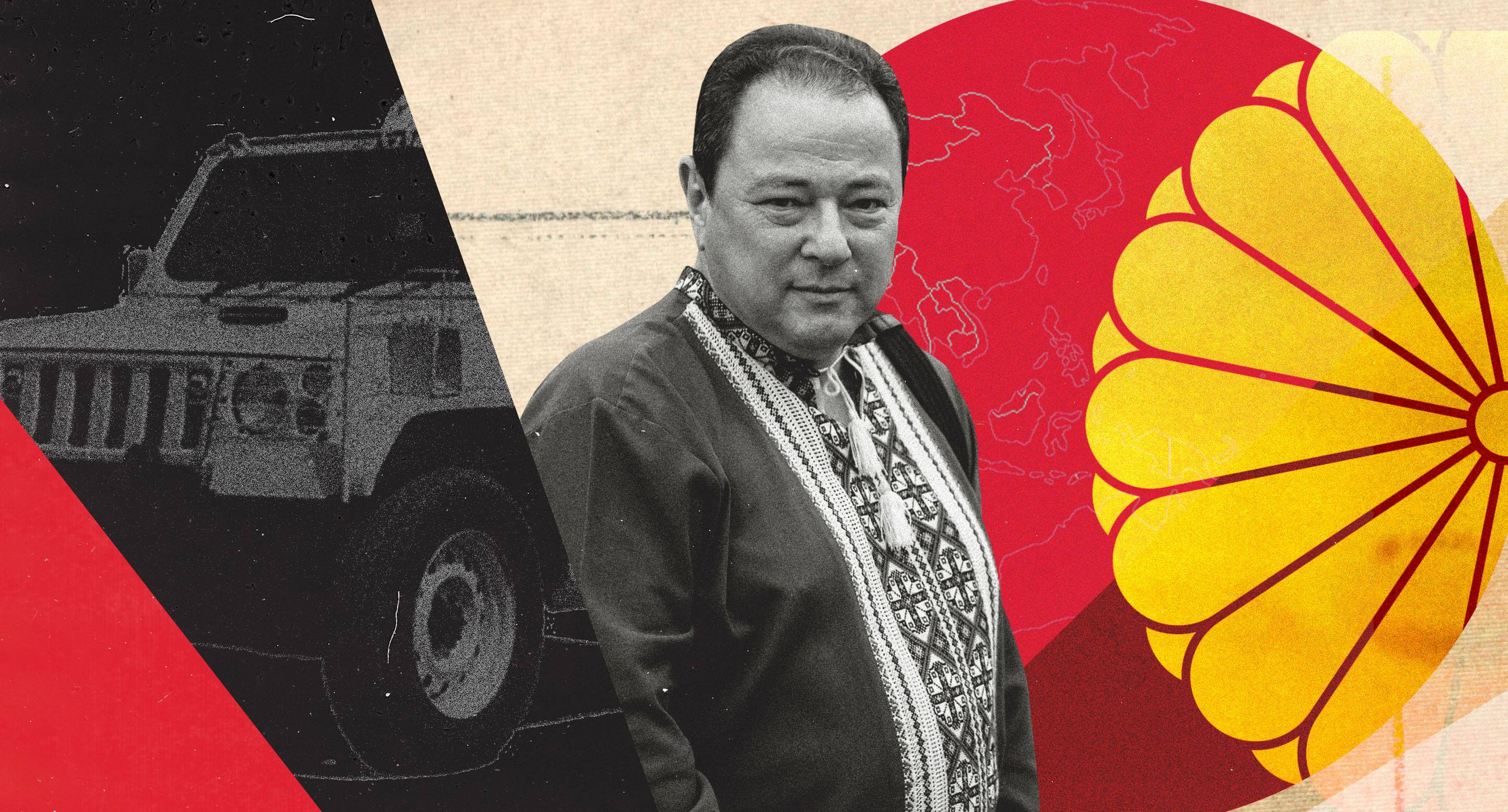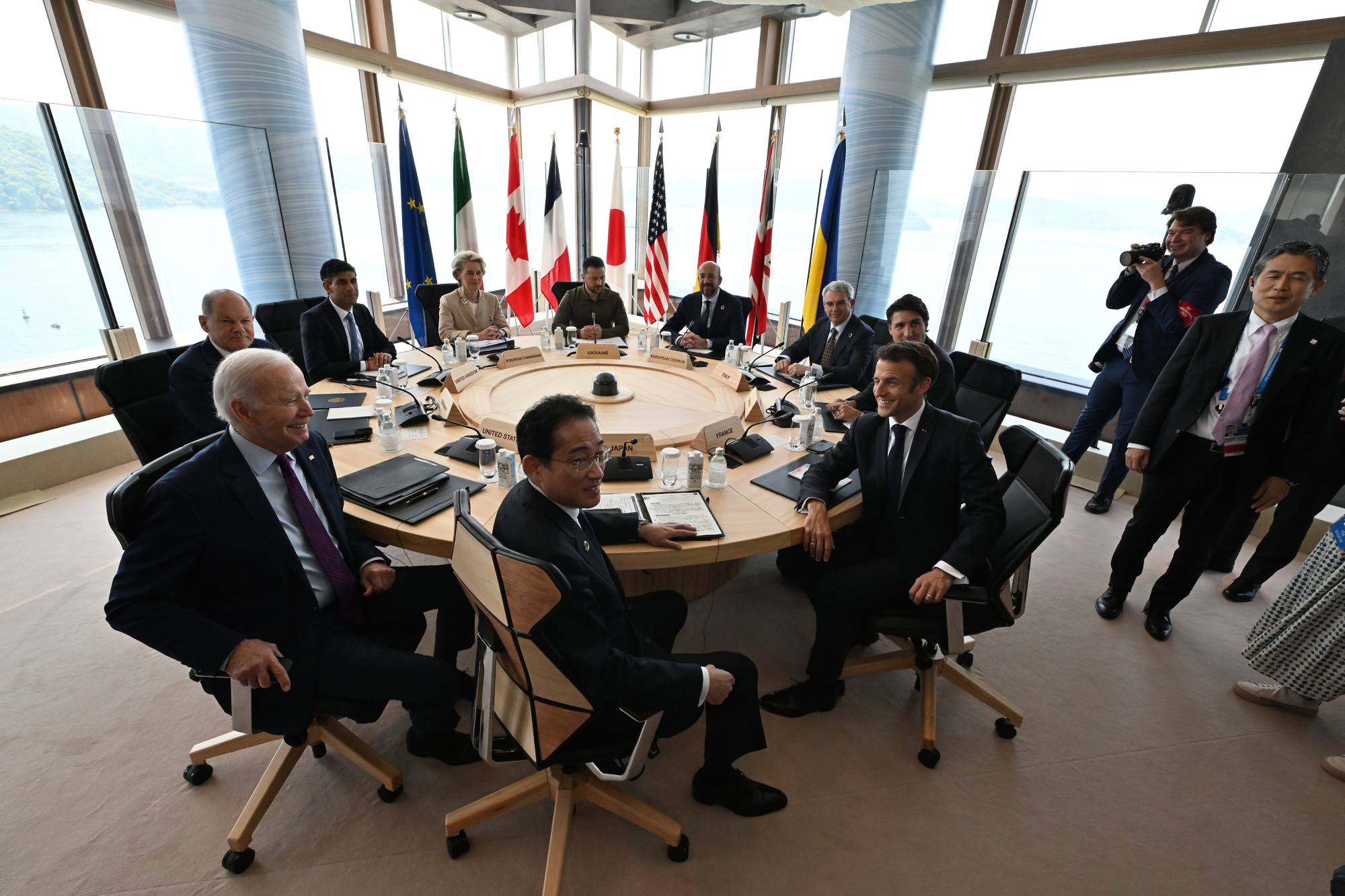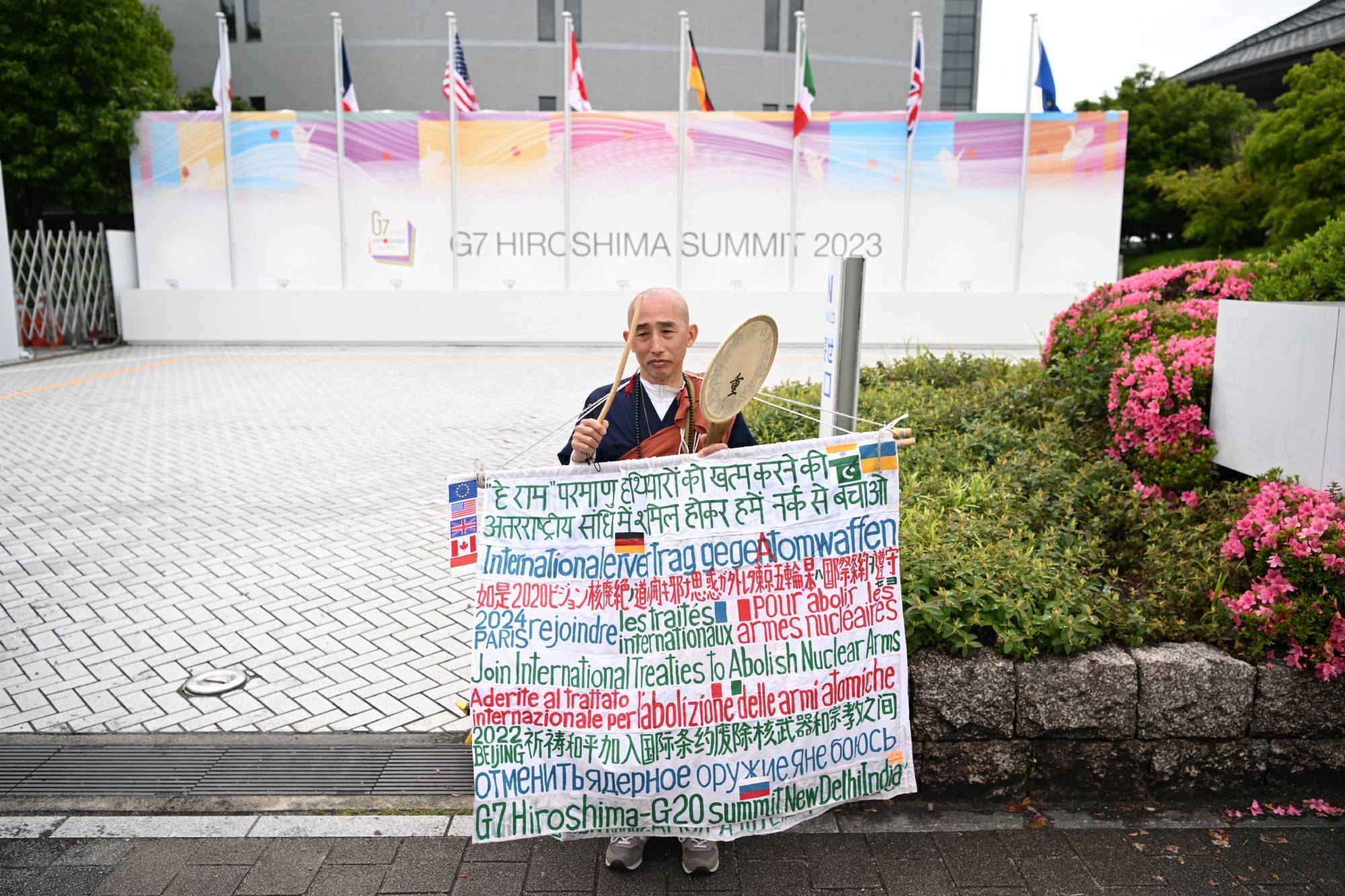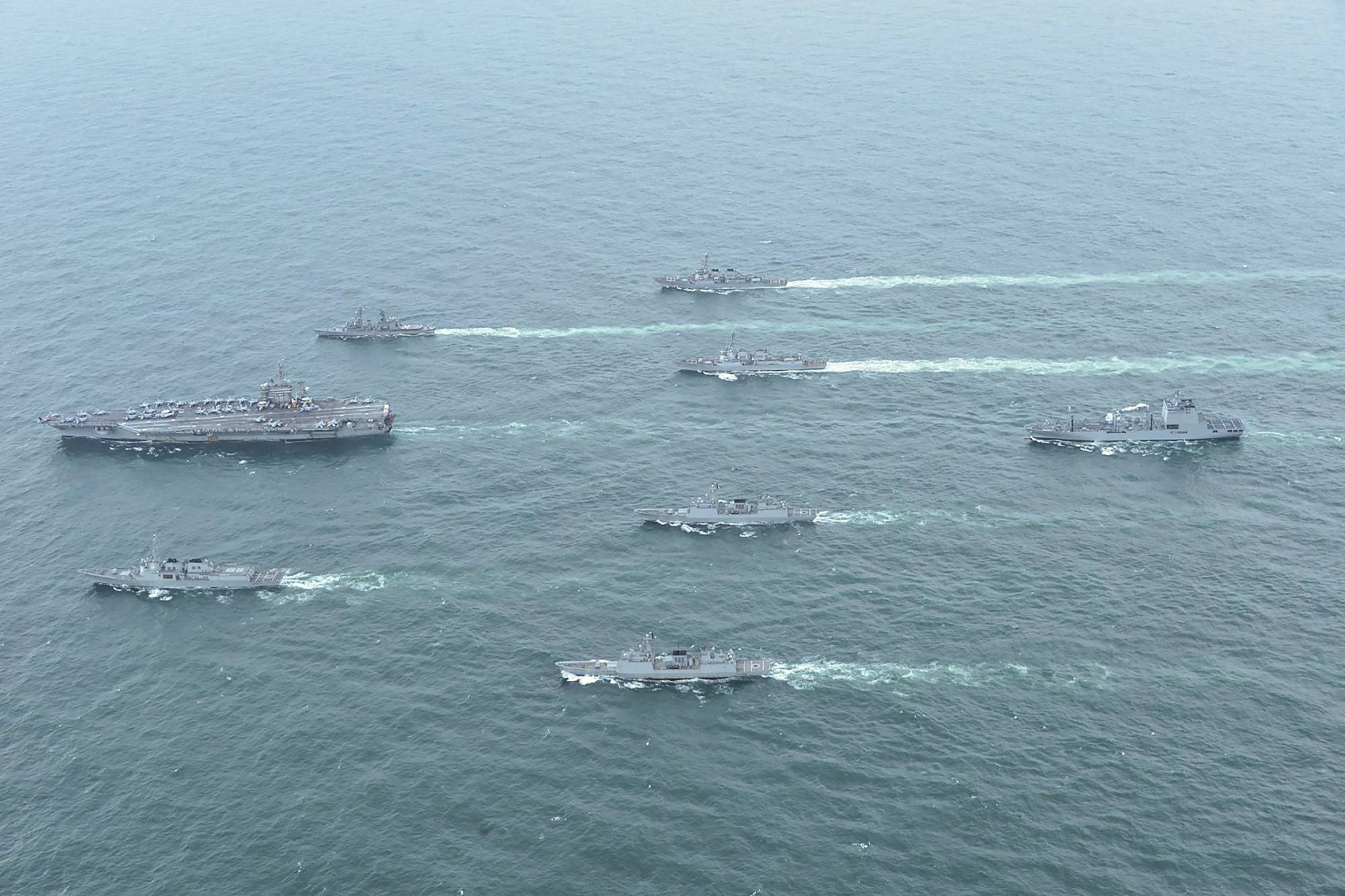The G7 summit, which turned into the G8, was held in Hiroshima, and Ukraine participated in it. Zaborona talked to Ambassador Extraordinary and Plenipotentiary to Japan Sergiy Korsunsky about this (as well as about the first NATO Asian office and possible wars in the region).

On May 19-21, the Group of Seven (G7) summit was held in Hiroshima and was attended by Ukrainian President Volodymyr Zelenskyy. Political analysts and political commentators interpret the summit as an anti-nuclear message to Russia, a signal of South Korea and Japan’s rapprochement with NATO, and Russia’s loss of its position in the G8 (which Ukraine symbolically took). In an exclusive interview with Zaborona, Ukraine’s Ambassador to Japan Sergiy Korsunsky spoke about his own interpretation of the summit, the number of territorial conflicts in Asia, and whether a war with China is possible.
How would you summarize the G7 summit? How successful was it for Ukraine in particular?
This summit was important at least because it is the first time in history that the President of Ukraine personally participates in the G7. Previously, President Zelenskyy participated [in international events] online. This is the first time that the President of Ukraine has been invited to such a summit – we saw the G8 format. We remember that until recently, Russia was also a member of the G8, and now Ukraine is there, which is a powerful message to all countries about how the democratic, developed world supports us.
A very long and very informative statement on Ukraine was adopted, which lists all the political decisions made by the seven countries participating in the summit. They show that there is no fatigue [from Russia’s war against Ukraine]. It was said unequivocally: the partner countries will support Ukraine until we win on our terms, the way we see it. In addition, the leaders of other countries supported the idea of holding the Peace Formula summit in Ukraine this year. Also, during the international meeting, measures to strengthen sanctions [against Russia] were formulated.
Very important states were invited to this summit, including India, Indonesia, South Korea, and Vietnam, who had the opportunity to see the support for Ukraine and listen to the president. While South Korea is helping Ukraine, India and Indonesia are, to put it mildly, very neutral – we need to explain to them our vision of the development of events and what we are going to do.

G7 leaders meet with Ukrainian President Volodymyr Zelenskyy at the G7 leaders’ summit, May 21, 2023, in Hiroshima, Japan. Photo: Pool / G7 Hiroshima / Planet Pix via ZUMA Press Wire
In addition to the Russian-Ukrainian war, the summit discussed nuclear disarmament. Is this due to Russia’s nuclear blackmail?
The summit was held in Hiroshima for a reason: the city suffered from a nuclear bombing, and [Japanese Prime Minister] Fumio Kishida is from there — if we’re talking about nuclear disarmament, it’s Hiroshima. For the prime minister, this is very important because Japan remembers those terrible events. In addition, we have one nuclear paranoid person next to us, because Japan is surrounded by three countries with nuclear weapons [including Russia].
In particular, the DPRK is constantly firing toward Japan. China has doubled the number of nuclear weapons in two years. It does not threaten anyone with nuclear weapons but rather opposes their use. However, when a neighboring country is actively increasing the number of nuclear weapons (as far as I know, China has 400 warheads today, with plans to increase to 1,500 by 2030), isn’t this a factor for concern?
Therefore, for an island country that does not have nuclear weapons and cannot have them under national law, this is a very painful situation. It was from Hiroshima that the head of the Japanese government wanted to send a message to develop political solutions to strengthen nuclear safety.
The President of Ukraine, in turn, addressed the Japanese people at the conference center of the Hiroshima Memorial Park. This message was very well received: the President told what happened at the Zaporizhzhya NPP, what the Russians did in Chornobyl, and what the threat of using tactical nuclear weapons is. I think this will help support our steps to avoid a nuclear disaster, the consequences of which would be global and extremely traumatic for the Earth.
The United States, of course, needs to have a security system in the region that allows us to maintain peace, so during the Hiroshima summit, there was a joint meeting of representatives of India, the United States, Japan and Australia, as well as talks between the United States, South Korea and Japan. All this is for the sake of security in the Pacific region, especially nuclear security.
How did Russia’s attack on Ukraine affect the security situation in the world, given that Asian countries are building up their military capabilities?
Russia’s gigantic stupidity is that it has opened Pandora’s box. It has made it possible to wage colonial warfare in the 21st century, which the whole world has lost. They [the Russians] refer to the wars in Iraq, Afghanistan, and Yemen. These are not colonial wars, because there was no question of seizing and annexing territories or destroying ethnic groups. The last colonial war ended when Iraq tried to seize Kuwait but was beaten back.
When Russia attacked Ukraine, everyone began to watch closely: it turned out that China borders 14 countries, with 18 territorial disputes between them. China is not at war, except with India [with whom it has clashed in the Tawang sector] in the Himalayas. Part of Japan is occupied by Russia, and part of the territory – the Senkaku Islands in southern Japan – is claimed by China. The situation around Taiwan is unclear. This list can go on for a very long time. If you carefully study this [Asian] region, you will find that there are no two countries here that do not have territorial claims.
Let’s imagine that Vladimir Putin wins [the war with Ukraine]. I have no doubt that this will immediately lead to a trigger reaction in other countries and regions where there will be a desire to repeat Putin’s “success.”
The situation is almost similar in South America, where there are also countries with territorial claims. Relative peace was based on the understanding that there is a global security system, the UN Security Council, and countries like the United States that are ready to intervene and end conflicts. Unfortunately, today we know that the UN Security Council does not work because it has not been able to stop a single war. A member of the UN Security Council [Russia] is itself an aggressor, and it also has the right to veto. Therefore, countries are looking for other formats and other agreements.

A Japanese Buddhist monk holds a solitary picket against nuclear weapons on the first day of the G7 leaders’ summit in Hiroshima, May 19, 2023. Photo: Yuichi YAMAZAKI / AFP
Despite tense relations, on the eve of the summit, Japan and South Korea announced that they would join forces to combat security challenges in Asia. What is your reading?
These countries have been confronting North Korea since the end of the Korean War [1950-1953]. There are indeed historical, painful issues between South Korea and Japan that go back to World War II. Unfortunately, they still cast a shadow over their relationship.
But the new leader of South Korea and the new leader of Japan have already had several meetings. This, in my opinion, is the right decision, because you can’t move forward when your head is looking back. The countries have launched a new format of dialogue, although the South Korean leader is criticized for this. But he clearly holds the correct view that security is indivisible. If North Korea strikes one of these countries, the other will suffer. The United States is actively promoting the resumption of this dialogue.
Even with the U.S. Seventh Fleet in the region and a military base in South Korea, allied countries know that this is a very dangerous situation if North Korea decides to go to war. The DPRK could certainly be pushed by Russia, which is very interested in keeping tensions in Asia so that the US focuses on Asia, not Europe. Imagine what it means for the US side to stretch its efforts over eight thousand kilometres. That is why the United States is encouraging the countries of the region to take steps to strengthen their own self-defense forces, missile and air defense systems, and navies.
South Korea and Japan have revised their strategic plans and are now rebuilding their armed forces based on the experience of Russia’s aggression against Ukraine, the way China is arming itself, and the development of North Korea’s nuclear and space capabilities.
How do you see the geopolitical situation in Asia developing in the future? Will it be possible to avoid conflicts in the region, or will there still be some clashes?
Everything will depend, first of all, on Ukraine’s victory, no matter how strange it sounds. If China and North Korea see that the West has achieved Ukraine’s victory, was not afraid of nuclear blackmail, that the necessary weapons have been provided, and that the necessary political and diplomatic steps have been taken, then China and North Korea will think very hard about whether they should start a war. The emergence of some kind of military junta and local conflict is possible, but there are forces in the region that will not allow this, so I don’t think it can lead to a large-scale war.
I think we know and understand who the possible aggressors are. Appropriate diplomatic steps are being taken against these countries. And the countries of the region are rearming: for example, Taiwan, South Korea, Japan, Thailand, Vietnam, and even India, which was dependent on Russian weapons, are now switching to American models because Russian weapons have disavowed themselves. South Korea has become the largest arms producer and supplier in the region. This is good because the country is democratic and can be trusted. Before that, Russia was such a country, and it cannot be trusted.
By aggressor, do you mean North Korea and China?
I don’t want to call these countries aggressors because they have not attacked anyone yet. However, such a persistent policy of the PRC and DPRK to promote their own interests in the South China Sea is unreasonable and contrary to international law, and territorial claims to neighboring countries are a fact of life. This is a matter of concern. China’s support for Russia, contacts between their defense ministers, and joint exercises. Isn’t this a reason for us to be concerned?
Japan has already announced its desire to open the first NATO office. The fact that it has become the host country of the G7 can also be read as a readiness to meet challenges and build up military capabilities.
Japan is increasing its [military] budget to 2% of GDP, and in a few years, it will become the world’s second largest defense spending country [after the United States, although China may take the second position]. Japan is rearming its defense forces and actively developing its own industry, creating new research centers. We are talking about high-tech weapons, lasers, missiles, and very powerful electronics. There is also an agreement between Italy, the UK, and Japan to create a new next-generation multi-purpose aircraft.

Joint naval exercises of the US Navy, South Korean and Japanese navies in international waters between South Korea and Japan, April 4, 2023. Photo: Handout / Japan Maritime Self-Defense Force / AFP
Will the G7 countries act proactively to counter China’s arms buildup?
There can be no decision. This is China’s right. How to respond to this arms buildup? By building up weapons in response. It’s called an arms race, and we’ve been through it all.
China is an extremely important country that can play a very positive role in the world. China’s trade with the US and the EU is worth $1.5 trillion. China cannot afford the luxury of having bad relations with these countries, because it needs this trade very much. We have to realize that rather harsh political statements [by Chinese diplomacy] are just political statements. Western countries are trying to engage in a dialogue with China, and I think it will continue.
In Hiroshima, Biden said that he hoped for warmer relations with China and more intense dialogue. Last year, the US leader met with Xi Jinping, and I’m sure they will meet this year. Perhaps in India at the G20 or some other forum. The fact that the democratic world is criticizing China does not mean that China is an outcast that should not be dealt with. We need to talk to the Chinese authorities.
Ukraine has also established negotiations with China. This is a complex country and culture, and it needs to be handled with care and respect. Of course, the Chinese react very painfully to any criticism of them, because in the Eastern mentality, the public face is an incredible value, it must be untarnished. But at the same time, they are well aware of how the world works, and how the global economy works. Talks about the yuan replacing the dollar and the Chinese language replacing English are premature, to put it mildly. But this does not mean that the West can stay in hibernation, as it was before the Russian aggression.
We are now seeing a powerful dynamic – the world is moving to a bipolar model: China+ and the United States+. This model is likely to determine the geopolitical situation in the near future. For us, it is important that this construction does not include Russia, it is not interesting to anyone, it has lost its authority, and it has narrowed the range of its maneuver – economic, political, diplomatic – to a microscopic point called China. And this is not just a disadvantage. In terms of the geopolitical situation, this is a disaster.
Japan’s foreign minister has said that the country wants to strengthen cooperation with NATO: negotiations are already underway to open the Alliance’s first liaison office in Asia. What does this mean? And what does Beijing not like?
The information office will be opened. It does not pose any threat to China, but the Celestial Empire reacts very painfully to any steps in this region. The opening of the NATO office in Japan is a counter to Russian propaganda, which tells everyone that NATO is an aggressor, a terrible structure that only fights incessantly. This will demonstrate to everyone in the region that the Alliance is a defense bloc.
In dialogue with other countries in Southeast Asia, there will be a growing understanding that the NATO model is very effective in terms of deterring any aggressor, and perhaps in time some kind of collective security treaty will also emerge in the Asian region. So far, there is none.







